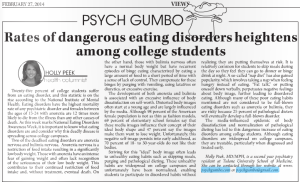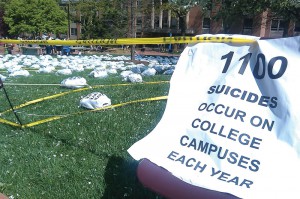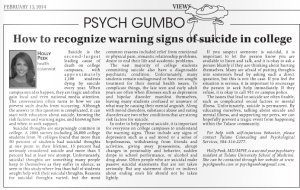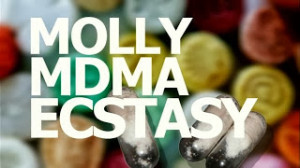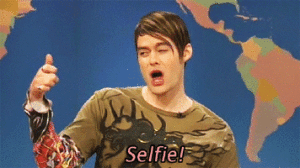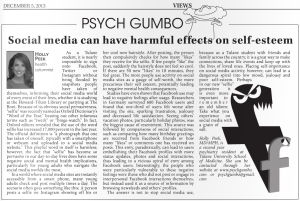The Hookup Culture: does casual sex lead to depression, anxiety and low self-esteem?
It is no secret that casual sex is common on college campuses. In fact, studies have shown that 60 to 80 percent of college students have had some type of casual sex experience. Much research has focused on the link between casual sex and the negative effects it may have on a person’s mental health, such as contributing to depression, anxiety or low self-esteem. Much of this research is inconclusive or with mixed results. However, new research has indicated that it is not if a person participates in casual sex but the reasons behind their actions that contribute to negative emotional effects. To learn more, check out my latest article in The Tulane Hullabaloo.
Rates of eating disorders heighten among college students
Twenty-five percent of college students suffer from an eating disorder, and this statistic is on the rise according to the National Institute of Mental Health. Eating disorders have the highest mortality rate of any psychiatric disorder and females between the ages of 15-24 with anorexia are 12 times more likely to die from the illness than any other causes of death. Pathological dieting and poor eating habits have become normalized on college campuses, with students skipping meals or or doing “fad diets” so that they can go out to eat or binge drink at night. To learn more about eating disorders on college campuses, check out my article appearing in The Tulane Hullabaloo.
For more information, check out these links:
How to recognize warning signs of suicide in college
Suicide is the second-largest leading cause of death on college campuses, with approximately 1,100 students dying by suicide every year. Click my latest column below to learn more about suicide in college students, the risk factors and warning signs, and knowing how and when to seek support. Although the answer to preventing these tragedies is complicated, it can certainly start with educating ourselves about this tragic mental health issue.
Students should be aware of effects of MDMA
Pop culture icons such as Miley Cyrus, Madonna and Kanye West have glorified through their music the use of a popular drug called Molly, also known as MDMA or ecstasy. The drug has become very popular in the college party scene with a reported 5.8% of college students having used the drug in 2013. Although drug users often report a euphoric high from the drug, there is a dark side including serious physical and mental health risks. Check out my latest column to learn more!
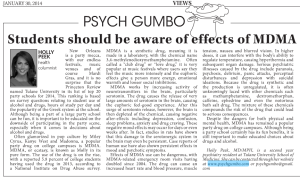
Demystifying Therapy
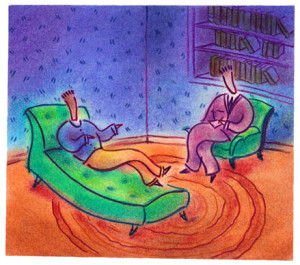
Therapy can benefit many people but is too often avoided. Some think they will be labeled as “crazy” by simply going to a therapist while others don’t understand exactly what goes on in the therapy room.
On this edition of Psych Gumbo, we will demystify the therapy session by discussing popular forms of therapy, who can benefit from therapy and how to shop for a good therapist.
Today’s special guest is Dr. Arjune Rama. Dr. Rama is a third year psychiatry resident at Yale School of Medicine. He also writes regularly about psychiatry in print and online. His work has been published in The New York Times “Motherlode” blog, Slate.com, and The New Haven Register among others. In addition to his clinical work he also teaches interviewing and writing skills to medical students in Yale’s psychiatry clerkship.
How does social media make you feel?
Do you ever make a Facebook, Twitter or Instagram post and then keep checking the likes, favorites, and retweets? Are you annoyed by selfies, yet take many of your own? How great do all those birthday wishes on Facebook feel? And don’t you wish people would just stop posting about their fabulous vacations and engagement rings!?
Social media is a great way to keep in touch with friends, share good news and network for business. However, there is a dark side to social media. Check out my latest article in the Tulane Hullabaloo!
Self-injury is common and treatable in college
As a psychiatry resident working in New Orleans, I have the opportunity to treat a wide range of interesting people. I also have the great opportunity to work with college students when they show up to the Tulane emergency room in crisis. Something that I often see in these students and other young adults is a pattern of self-injury.
What may seem strange or scary to some, is a daily impulse for others. Check out my latest column in The Hullabaloo: 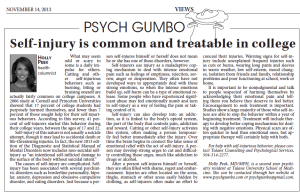
Why is mental illness scary?
Vampires, werewolves, witches and….the mentally ill? Halloween is a time we face our fears and make light of them by enjoying decorations, costume parties and horror movies. How has mental illness been lumped with the scary and supernatural themes of Halloween? Check out this blog post from Psychology Today that I helped co-write with Broadcast Thought!
http://www.psychologytoday.com/blog/broadcast-thought/201310/why-is-mental-illness-scary
LGBTQ Mental Health: Facing the Double Stigma
The LGBTQ community is a population that is faced with stigma and stereotypes. Because of this, those in this minority population are often more susceptible to mental health issues and are at higher risk for suicide. In fact, LGBTQ adults are 2.5x more likely than heterosexuals to have had a mental health disorder related to mood, anxiety or substance abuse, in their lifetime. Furthermore, the rates of suicide attempt among LGBTQ youth are 20-40% higher than among non-LGBTQ youth.
In this week’s Psych Gumbo, Dr. Holly Peek discusses mental health issues of the LGBTQ community with special guest, Dr. Myo Thwin Myint. Dr. Myint is a physician with training in pediatrics, general psychiatry and child & adolescent psychiatry. Among others, his interests includes LGBTQ mental health.
Here are some recommended resources for more information on LGBTQ mental health:
Meet the docs of Broadcast Thought: “Accuracy in Entertainment and Entertainment in Accuracy”
The doctors of Broadcast Thought provide expert consultation to the media and entertainment industries. Not only are they psychiatrists specializing in forensic, child adolescent, and adult psychiatry, they are also big fans of television, film, comic books, and pop culture. Self proclaimed “big kids,” they use their interests in pop culture to help educate the public about mental illness and decrease stigma by acting as creative consultants, subject matter experts, and co-producers of mental health content in pop culture.
Dr. Holly Peek will be discussing the portrayal of mental health in the media and entertainment industry. She will be interviewing two expert psychiatrists in this field, Dr. Vasilis Pozios and Dr. Praveen Kambam, who specialize in ensuring the portrayal of mental health is both accurate and interesting. These doctors are also just back from presenting at Comic Con in San Diego and are ready to talk about it!


